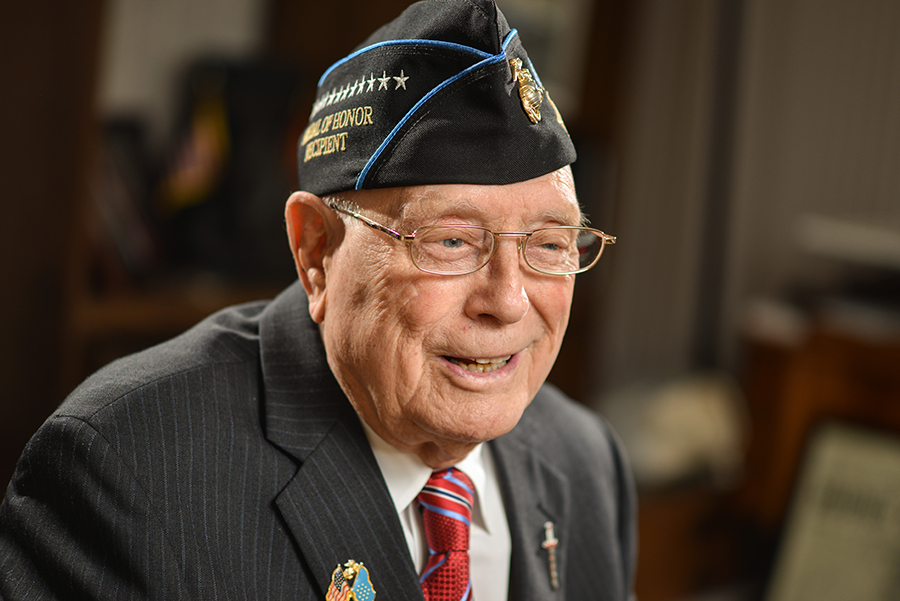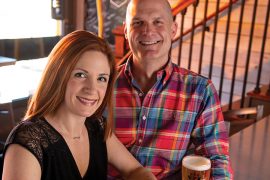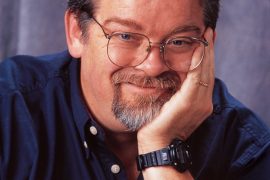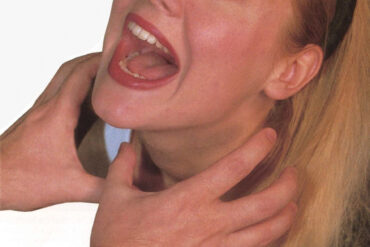Iwo Jima’s last surviving Medal of Honor recipient talks to HQ about his past, our nation’s future and why being called “West Virginian” is one of his greatest honors.
Interview by Katherine Pyles
HQ 92 | WINTER 2016
Growing up, Hershel “Woody” Williams knew his future would include one of two things: working on his family’s dairy farm in Quiet Dell, West Virginia, or joining the Marine Corps. He had never heard of the Medal of Honor and never dreamed that in just a few years he’d be recognized as one of our nation’s greatest heroes.
“I don’t think I’d ever used the word ‘hero’ in my life,” says Williams, 92, one of only 77 living recipients of the Medal of Honor, the military’s highest decoration. “Where I came from, you had a job to do and you did it.”
Williams enlisted in the Marine Corps in May 1943, and in January 1944 he joined the 3rd Marine Division at Guadalcanal, where he was selected for special training as a flamethrower and demolition specialist. In July 1944, Williams participated in the invasion of Guam, a U.S. territory that had been held by the Japanese since 1941. When the flamethrower proved ineffectual against the island’s jungle and rocky terrain, Williams had to rely on his training as a rifleman until the island was secured in August. It wasn’t until he entered the Battle of Iwo Jima in February 1945 that his special training was put to the test.
By February 23, just five days into the conflict on Iwo Jima and two days after his company arrived on shore, Williams was the only flamethrower operator in his company who had not been wounded or killed. Covered by only four riflemen, Williams went forward alone, with a 70-pound flamethrower on his back, in an attempt to neutralize enemy “pillboxes” – reinforced concrete bunkers filled with Japanese soldiers who were gunning down the Americans with relative ease. Over the course of four hours, Williams neutralized seven pillboxes, clearing a path for U.S. infantry to advance to the island’s central airfield. Under constant gunfire, he repeatedly returned to his own lines to obtain serviced flamethrowers before returning to the front, destroying one enemy position after another.
Williams continued to fight during the five-week battle, even after suffering a shrapnel wound to his leg on March 6. He returned to the United States when World War II ended and was presented the Medal of Honor by President Harry Truman on Oct. 5, 1945.
Since that day, Williams has dedicated his life to serving veterans and their families. We asked former HQ managing editor and freelance writer Katherine Pyles to sit down with Williams for a candid conversation about the past, his hopes for the future and his favorite thing about living in Huntington.
You grew up on a dairy farm in Quiet Dell, West Virginia, just outside Fairmont. What made you decide to become a Marine?
We had no military influence in our small community, but we did have a couple of fellows go into the Marine Corps. They would come home once a year in their dress blue uniform, and I thought they were dressed immaculately. The rest of us were in overalls and no shoes. I was sure I’d be a farmer my whole life, but I thought, “If I ever do go in the Armed Forces, I want to be a Marine. I want to look like them.”
When Pearl Harbor was attacked, you were in Montana with the Civilian Conservation Corps, a work relief program for young men started during the Depression. Did everything change for you that day?
I joined the Civilian Conservation Corps at the age of 16. They paid $21 a month, and in my day that was a tremendous amount of money. When the war came along, they gave me two options: I could go straight into the Army and fight for America, or I could request a release and come home – as long as I was going to join another branch of the military and fight for America. I had two brothers in the Army, and I did not like their uniforms at all. So, I said I needed a release because I was going to join the Marines.
You were 17 when the war began, but you didn’t enlist until the age of 19. What happened during those two years?
To enlist at 17, I had to have parent consent. My father was deceased and my mother was trying to run a dairy farm, and I knew there was no hope she was going to sign my paper. Sure enough, she wouldn’t. After I turned 18, I went to enlist, but I was only five-foot-six and at that time you had to be five-foot-eight to be a Marine. I said, “Well, if I can’t go in the Marines, I’m not going to go at all,” and went back to work on the farm. A year later, the height requirement was reduced to five-foot-two, and I went back and joined. There was no question in my mind at that point. I was going to be a Marine. By May of 1943, I was accepted into the Marine Corps and sent to boot camp in San Diego. California seemed so far away to me. I thought I’d never get back home.
As you went through boot camp in San Diego and special weapons training at Guadalcanal, were you thinking of those two Marines from your hometown and wondering what you had gotten yourself into?
Boot camp is the conversion of a person from civilian life to Marine life. It’s an intense 13-week training period, and at the end of those 13 weeks something happens to you psychologically. You develop a camaraderie that I’d never experienced before, even with my own brothers. From that point on, your life depends on the other guy and his life depends on you. You’re going to take care of each other, whatever the cost may be. By the time I got to Guadalcanal, the influence those dress blue uniforms had on me had been long lost.
You were trained as a flamethrower and demolition specialist. How were you chosen for that special training?
I have no idea how or why I was selected. We’d never seen one before. We didn’t know how to use it and had virtually no instruction on it. We had a manual, and that was our method of learning what to do with it. Our gunnery sergeant actually had to develop a different type of fuel to use because the fuel that came with it was ineffective.
How was the flamethrower meant to be used?
The Japanese had built 800 pillboxes all over Iwo Jima and hollowed out 19 miles of tunnels, some as deep as 32 feet underground. So even though the Navy bombed the island day after day for 130 days, the bombing didn’t have much of an impact. The enemy was either in caves, in pillboxes or underground. The only way to eliminate a pillbox was to burn it out with a flamethrower or blow it up with demolition, and that’s what I was trained to do.
Iwo Jima is only 4.5 miles long and 2.5 miles wide. Why was the island so important?
Iwo Jima is smaller than Huntington, but it was only about 600 miles from Japan and it had an airfield. Our bombers flying from Guam and Saipan and Tinian were being shot down by fighters on Iwo Jima, and we had no way of rescuing them. If we could get the island secured, then our B-29s that ran out of fuel, had engine trouble or were damaged in some way would have a place to land. Between when we secured the island in March and the end of the war in September, our B-29s made 2,500 landings on that island.
Did you know then the tactical and historical significance of what you were doing?
Everything I learned was after the fact. After we took Guam, we continued to train for jungle warfare because we didn’t have any idea where we would go next. Of course, there was no jungle on Iwo Jima when we got there, but we didn’t know that ahead of time. When we came back from Iwo Jima, we had no idea that the war was going to end, and we began training as if we were headed to Japan. We were training for street fighting. I’ve been told that there would have been 1 million casualties if we had invaded Japan. The atomic bomb, I believe, saved my life.
In those four heroic hours on February 23, you wiped out seven pillboxes. What do you remember about that day?
I remember very little. I was a section leader, so it wasn’t my job to go out and use a flamethrower and blow up things – that was the job of my six Marines. My job was to supervise. But all six had been wounded or killed, and I was the only one left in my company with that type of training. Our commanding officer called a meeting in a great big shell crater and asked if I could take out some pillboxes with the flamethrower, and I said, “I’ll try.” At least that’s what they tell me I said. I strapped a flamethrower on my back and crawled toward the pillboxes. Don’t ask me how I did it. I have no idea. Somehow, I never got touched.
That was the same day the U.S. flag was raised on Mt. Suribachi. Where were you during that iconic moment?
I was on the beach, about 1,000 yards from Mt. Suribachi, when the flag went up. The first flag was only about 3 feet by 5 feet, and none of us could see it. They went back to a ship and got a bigger flag, about 4 feet by 6 feet. We saw that one. The picture was taken when that second flag was raised. Marines around me jumped up and started firing their weapons in the air, and I thought everyone had lost their mind. But then I saw the flag, and I jumped up and started doing the same dumb thing they were doing. Morale was low at that point, and we had lost so many men. The flag gave us hope.
You and 13 other soldiers from Iwo Jima received the Medal of Honor on Oct. 5, 1945. How did the ceremony impact you?

There were 27 Medals of Honor as a result of Iwo Jima. Thirteen of us got to come home, and the others died earning theirs. I don’t remember the president’s speech that day, but I remember what he said to each one of us: “I would rather have this medal than be president.” President Truman was a World War I guy and knew what was required to receive the medal. It had a meaning to him that no president we’ve had since could understand.
You are among only 77 living Medal of Honor recipients, and you are the last living recipient from the Battle of Iwo Jima. Do you stay in touch with other recipients and their families?
I was chaplain of the Medal of Honor Society for 35 years. When a recipient died, it was my responsibility to talk with the family and give them a memorial service. We still have a convention every year, and we also have a memorial service in honor of everyone we lost in the past year. We’re a very close-knit group. We all have basically the same values when it comes to patriotism, love of country and service to others.
In what ways have you continued to serve our nation’s veterans?
I worked as a VA counselor for 33 years, and it was the best job anybody could ever have. I was at the VA Regional Office, which used to be on the corner of Fifth Avenue and Eighth Street, from 1957 until I retired in 1979. It was my job to advise veterans and their families of benefits available to them through the government and assist them in getting the benefits they were entitled to. I counseled veterans on where they could get treatment and the facilities and programs that were available to them.
You have lived in the Huntington area for 58 years. What’s unique about our community?
Huntington is a second home to me. It’s one of the prettiest cities we have in the state, and it’s the best laid out. You can find your way around without a whole lot of trouble.
What did you love most about your 63-year marriage to your wife Ruby, who passed away in 2007?
I’ve said many times that I married an angel. She had to have been an angel to put up with me. We have two daughters, five grandsons and two great-grandsons, and our families have just been so blessed. No one called her Ruby – everyone called her “Oma.” She was our tribe’s spiritual leader and greatest influence.
Tell me about the Hershel Woody Williams Medal of Honor Foundation you founded in 2012.
Most states have a veterans memorial near their capital. We have one in West Virginia with 11,000 names on it, honoring those who gave their life in combat for America. The veterans themselves have received reasonable recognition, but the families of those who gave their life have received absolutely none. Of 1,100 monuments in D.C., not one pays tribute to the people who’ve lost a loved one – the parents and children and grandfathers and grandmothers and cousins and uncles and aunts who sacrificed their family member for our freedom. We recognize Gold Star Mothers, but we should be recognizing Gold Star Families. Our main focus right now is promoting and implementing Gold Star Families memorial monuments throughout the country.
In 2013, you established the nation’s first Gold Star Families memorial monument at the Donel C. Kinnard Memorial State Veterans Cemetery in Dunbar. How many monuments have been built since then?
We’ve built monuments in Pennsylvania, Indiana, Ohio and Florida. There are two in West Virginia – in Dunbar at the veterans cemetery and in Fairmont near my hometown. Fundraising is already underway for 19 monuments that will be placed all over the country. We want a Gold Star Families memorial monument in every community, in every state. That’s our goal, and we’re going to work at it as long as we can. All we need is support from the community and the help of those who are able to help.
Is Huntington planning to build a Gold Star Families memorial monument?
We are going to put one at Spring Hill Cemetery near the Marshall Memorial, but we still need to raise about $20,000. I’d encourage the people of Huntington to go to our website (www.hwwmohfoundation.org) and learn about our program, then assist in making it happen. We’ve already seen a tremendous emotional impact with the memorials. There are fathers who’ve lost children but have never heard the words, “You’re a Gold Star Dad.” This is a father who gave one of his children for our freedom, and no one has ever said that to him. When he’s recognized for that for the first time, it’s tremendous.
It was recently announced that a Naval ship would be named in your honor. You’re only the fourth namesake for this type of ship. What is most special to you about this recognition?
A friend of mine, Ron Wroblewski, is a Huntington Marine who served in Vietnam. He’s the one who started this campaign to get my name on a ship, and before he started he asked me if I had any objections. I said, “No, but you have to be dead to get a ship named after you, and I’m not going to die.” Of course, now they name ships after living people, and Ron has been working to make it happen since 1997. When the Navy called and said it was going to happen, my heart almost quit. Thank the Lord, it didn’t. I am absolutely ecstatic. I am just so appreciative that my country would do that for me.
What gives you the greatest hope for our nation’s future? What gives you the greatest worry?
The commitment and dedication of our Armed Forces is still there. We still have soldiers who would sacrifice their life for another. It happened just a year ago in Afghanistan – a Marine placed his body on an explosive to save another Marine’s life. But I’m highly concerned about where the leadership of our country is headed with regard to the threats that exist today. I don’t feel like our leaders are taking the initiative and precaution that we ought to be taking to protect the American people. Before Pearl Harbor, we had all kinds of warnings – we didn’t know where or when, but we knew something was going to happen. I feel the same thing is going on today. We are not preparing ourselves for something that I believe will happen sometime in the future. We ought to be doing more than we are.
Do you think our nation has what it takes to win a large-scale conflict like World War II today?
I have no doubt about our Armed Forces. Our Armed Forces will step up to whatever is required. They have the same courage, values and commitment they have always had. But our leaders are not doing what they should to make sure our Armed Forces are prepared. If sequestration (part of the Budget Control Act that mandates $1.2 trillion in cuts across federal agencies, including $500 million to the military) goes into effect, our Marine Corps will have less people in it than we had before World War II. That is just ill advised.
In your service as a Marine, your recognition as a Medal of Honor recipient and your work with your foundation, you’ve encountered individuals from all over the world. What do you love most about the people of West Virginia?
My state has honored me far beyond any expectation I could’ve ever had. I was awarded the highest medal West Virginia gives – the Distinguished West Virginian award. I don’t know of anything that gives me more honor than being called a “West Virginian.” I’ve been around a lot, but West Virginia has always been home to me. It will be my home forever.





